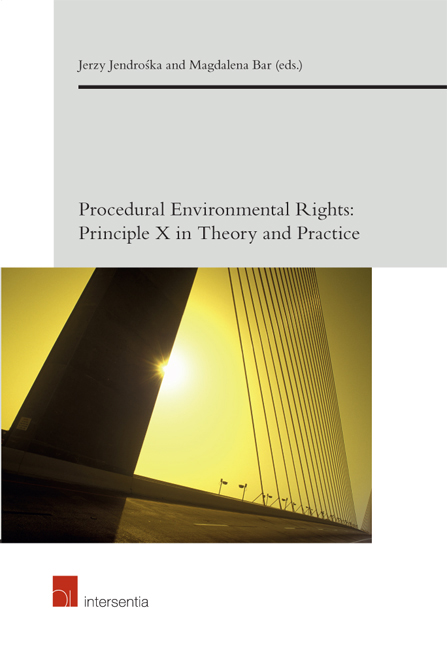Book contents
- Frontmatter
- Contents
- Introduction Procedural Environmental Rights in Theory and Practice
- Procedural Environmental Rights: Status and Developments
- Procedural Environmental Rights in Practice
- Public Participation
- The EU and Public Participation in Environmental Decision-Making
- Public Participation in Rulemaking and Decision-Making in Environmental Matters – Legal Framework and Jurisprudence in Spain and the Basque Country
- Legal Instruments to Protect Indigenous Peoples’ Participation in Europe and in the Arctic Region
- Notifying the Public as a Part of the Public Participation Procedure in EU, Polish and Ukrainian Law
- Public Participation Rights Enhancement within the Wind Power Plants Location in Poland in the Context of EU Renewable Energy Requirements
- Access to Justice
- Procedural Environmental Rights and Nature Protection
- Procedural Environmental Rights and EIA
- Procedural Environmental Rights and Climate Change
Public Participation Rights Enhancement within the Wind Power Plants Location in Poland in the Context of EU Renewable Energy Requirements
from Public Participation
Published online by Cambridge University Press: 12 October 2018
- Frontmatter
- Contents
- Introduction Procedural Environmental Rights in Theory and Practice
- Procedural Environmental Rights: Status and Developments
- Procedural Environmental Rights in Practice
- Public Participation
- The EU and Public Participation in Environmental Decision-Making
- Public Participation in Rulemaking and Decision-Making in Environmental Matters – Legal Framework and Jurisprudence in Spain and the Basque Country
- Legal Instruments to Protect Indigenous Peoples’ Participation in Europe and in the Arctic Region
- Notifying the Public as a Part of the Public Participation Procedure in EU, Polish and Ukrainian Law
- Public Participation Rights Enhancement within the Wind Power Plants Location in Poland in the Context of EU Renewable Energy Requirements
- Access to Justice
- Procedural Environmental Rights and Nature Protection
- Procedural Environmental Rights and EIA
- Procedural Environmental Rights and Climate Change
Summary
ABSTRACT
A few years old delays in implementation of the Renewable Energy Directive into the Polish legal framework caused that it is likely that Poland may not achieve the national target for share of energy from renewable sources by the year 2020 and indicative trajectories for achieving the national target set out in Renewable Energy Directive (however it is not impossible yet). Additionally, the currently predicted leading role of wind energy sector within renewable energy sources development in Poland (and consequently the possibility of achieving by Poland the national target for share of energy from renewable sources by the year 2020) may be effectively constrained by many public protests regarding wind power plants location in Poland. In order to decline the range of public conflicts regarding wind power plants location, new regulations aiming at public procedural rights enhancement were enacted. The aim of the study is the analysis of possible impact of regulations currently introducing into the Polish legal framework on public conflicts regarding wind power plants declining and consequently the possibility of current and future European Union requirements within renewable energy sources implementation by Poland.
KEYWORDS
European Union requirements; renewable energy sources; wind power plant
INTRODUCTION
The aim of this article is presenting a possible impact of the currently enacted law on 20 May 2016 regarding investments in wind power plants upon reducing public conflicts connected with the location of wind farms, and in effect the possibility of meeting the current and future EU requirements regarding renewable energy sources. Will the adopted instruments allow to attain both these aims? In view of the fact that the law on wind power investments has been enacted only recently, there are no analyses (publications) in this respect available yet. It must also be emphasized that the subject matter of this article is related to a few collateral issues, which in view of its restricted frame shall only be signalled (a wider discussion might be the subject of a separate study).
- Type
- Chapter
- Information
- Procedural Environmental RightsPrinciple X in Theory and Practice, pp. 193 - 206Publisher: IntersentiaPrint publication year: 2018



